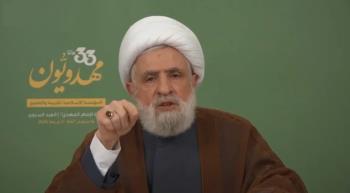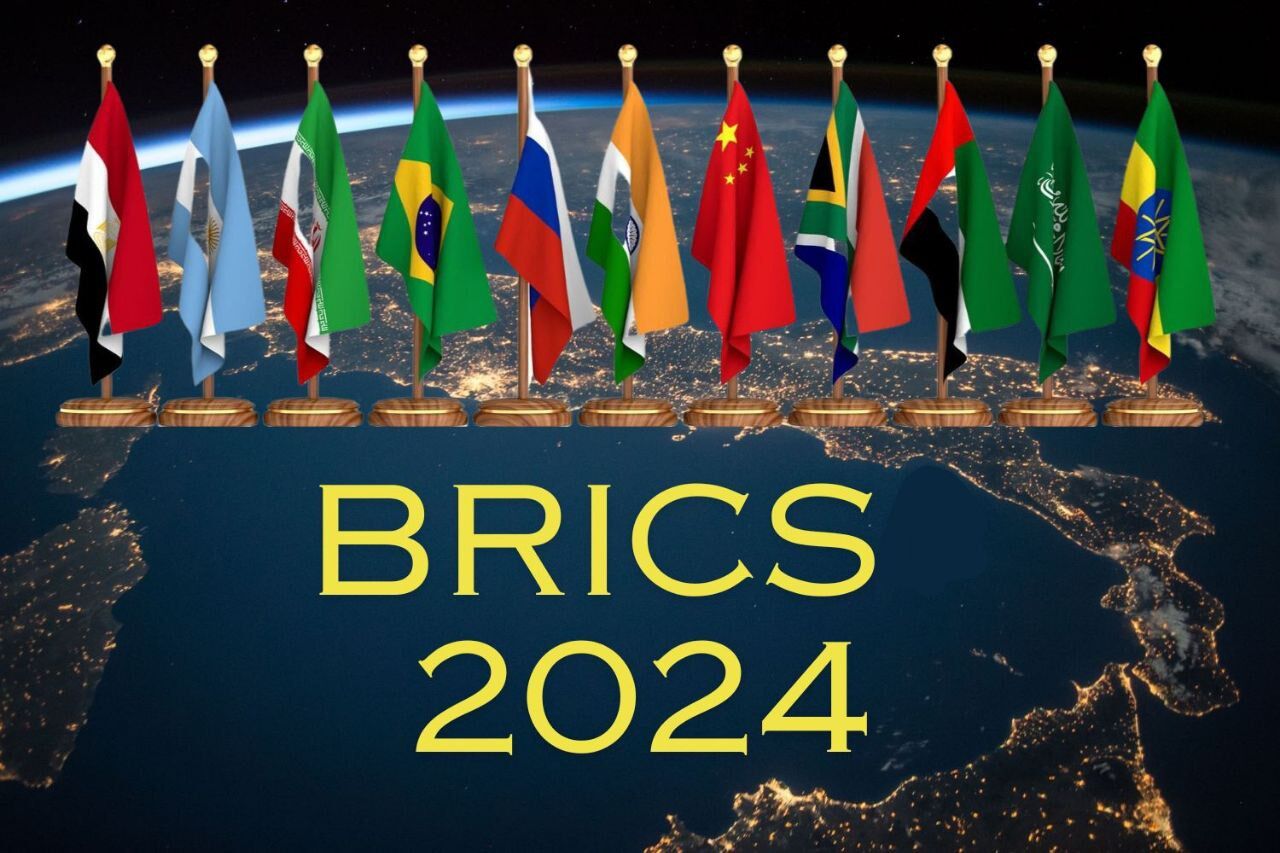Alwaght- While the global attention is captured by the wars in Eastern Europe, West Asia, and Africa, the structure of the world order is quietly molting. China and Russia-led developing countries are deepening with their influence in the global economic affairs and are founding replacements to the Western-dominated world institutions. Meanwhile, BRICS bloc is a key actor in this transition.
In this connection, the BRICS leaders' meeting started Tuesday in Russian city of Kazan and will last three days. In this meeting, which is the sixteenth of this economic bloc, representatives from 32 countries will participate, with 24 countries participating at levels of leaders. Iranian President Masoud Pezeshkian is also attending as Tehran was officially approved as a new member last year.
Antonio Guterres, the Secretary General of the United Nations, Zhang Ming, the Secretary General of the Shanghai Cooperation Organization, and the Secretaries General of the Community of Commonwealth of Independent States, the Eurasian Economic Union, the United State of Russia and Belarus, and Dilma Rousseff, the President of the BRICS's New Development Bank, are among the other prominent figures invited. Meanwhile, about 2,000 journalists from 59 countries have traveled to Russia to cover this event to show the high status and global attention to the results of this summit.
The participants of the Kazan summit will discuss key issues in the world economic and political arena, including cooperating in the field of security, reforming the international financial system, developing interbank cooperation, and expanding the use of national currencies in exchanges.
Also, BRICS leaders will discuss the resolution of regional conflicts, and it is possible that Ukraine, Lebanon, and Gaza conflicts will also be on their agenda, although no special meeting has been planned for these cases.
The Kremlin spokesman said that the BRICS event will include numerous bilateral and multilateral meetings, and Russian President Vladimir Putin will have bilaterals with all his counterparts.
Putin's aide Yury Ushakov held that currently 15 countries are bidding for BRICS accession. He added: "BRICS leaders will clearly constitute a group of countries that can be considered as partner countries in the first stage... Currently, 15 countries are being considered as suitable for participation in the BRICS group based on various criteria, including their impact on regional and international issues."
This Kremlin official added that accepting all applicants at the same time would not be logical, because in this case, BRICS would become a non-transparent and ineffective structure.
Russia holds the rotating BRICS presidency this year and has decided to use its presidency to focus on building a "fair world order" and steer towards local currencies and payment systems at the Kazan meeting.
The Russian-led BRICS meeting is being held as the Kremlin continues its third year of war in Ukraine. Analysts believe Putin is trying to use this opportunity to show that Russia is not isolated under Western pressure.
During its 16-year existence, the BRICS group has become a major political and economic force relying on its desire to create a balance against Western influence in global institutions, and its founders hope to increase their influence in the new world order.
Focusing on de-dollarization with BRICS Pay
Since BRICS is an economic platform and intends to increase its weight and position on the world stage and interactions, it has made efforts to realize this aim.
According to Moscow officials, on the sidelines of the BRICS summit, the new BRICS Pay payment system will be unveiled. This event is one of the definitive signs of the BRICS effort to ditch dollar from its financial transactiond, which will be strengthened by other means.
On the other hand, Russia has asked its partners to create an alternative to the International Monetary Fund (IMF) in order to deal with the political pressure of the Western countries, a suggestion that was recently discussed in the meeting of the heads of central banks of the BRICS members, who can run the test version of the new payment system at Wednesday meeting. Recently, the BRICS bank, called New Development Bank, has also started its operations so that the member countries of this economic bloc can easily do business, away from Western financial monitoring.
Since its establishment, this bloc has sought to coordinate the economic and diplomatic policies of its members, create new financial institutions and reduce dependence on the US dollar. The dominance of the dollar as a reserve currency in the trade of commodities such as oil gives Washington great leverage over the global financial system, which it has used over the past few decades to pressure rival governments. Countries such as Russia, Iran and Venezuela, which have been affected by US sanctions and export controls, are among the pioneers in promoting exchange with national and local currencies and other methods such as currency clearing.
BRICS Pay facilitates seamless transactions among the BRICS member countries, including Brazil, Russia, India, China and South Africa, and uses blockchain technology and smart contracts to enable transparent and decentralized decision-making.
This platform can support digital currencies or stablecoins linked to national currencies of member countries. This method allows BRICS Pay to reduce its reliance on traditional systems and minimize transaction costs.
Experts believe that if the BRICS countries use the BRICS currency for mutual business, it will definitely have an impact on the decrease in demand for the US dollar in the coming years. Undoubtedly, in case of realization, the operationalization and practical expansion of the use of financial and monetary institutions and payment systems among members can play an important and effective role in acceleration of de-dollarization.
BRICS expanding
Given the growing criticism of the Global South countries against the unfair structure of the current international order, the Russian and Chinese leaders intend to found alternatives to the Western-dominated financial and security structures, and they find expansion of BRICS as a crucial step towards this aim. In the past two years, many countries have bid to join the bloc, and accession of new members can elevate the global position of this economic bloc against the Western camp.
Joining this group of emerging economies has obvious economic benefits for the countries of the Global South. The 10 countries that now make up BRICS account for 45 percent of the world's population, 28 percent of the global GDP, and 47 percent of the world's crude oil output.
A report from the Boston Consulting Group maintains that "trade among the BRICS economies has significantly outpaced trade among the G7 countries, which has led to an increase in intra-BRICS trade."
Developing nations hope that BRICS membership will lead to boom of trade and investment in them. Having in mind that emerging economies such as Malaysia and major oil and gas exporters, including Saudi Arabia, have made their bids to join the bloc, with the joining of new members, more than half of the world's population will be in the BRICS camp. This issue besides increasing GDP of this economic bloc poses a serious threat to the Bretton Woods system, which after the WWII paved the way for Western dominance of global financial structures.
By increasing trade and economic cooperation between member countries, the main objective of BRICS is, indeed, to add several leading oil and gas producers, which will be able to take the pulse of the world's energy.
According to experts, the most important outcomes of BRICS expansion for the world economy is the use of local currencies to conduct bilateral trade and cut use of the US dollar. This shift can be seen in the context of the bloc's broader efforts to challenge the Western-dominated financial system.
Despite the fact that developing countries account for a significant share of the world's population, they play an insignificant role in setting the policies of international financial authorities such as the World Bank and the IMF, which still have significant financial power to allocate capital.
In the next decade, BRICS Plus, will likely see significant infrastructure investment that will improve the business environment and connect transit corridors, say experts.
The development of transportation, digital communications, energy, and other projects will create demand for global companies and provide opportunities for investors in BRICS, including China.
Also, in a more multipolar world, companies can build supply chains that can bolster the BRICS Plus economies, making them more resilient to geopolitical and trade shocks.
Countering unilateralism
BRICS summit is being held at an important juncture where the world is undergoing an important paradigm shift in the world power, with massive repercussions for the international peace and security. Multipolarity is the first trend to consider regarding the growing importance of BRICS. From the perspective of the leaders of the Global South, multipolarity offers the safest means of limiting a hegemony that, if unchecked, poses a threat to international norms and global security.
A stable and peaceful multipolar world requires an efficient multilateral system that is fit to meet the unique challenges of the 21st century. However, unfortunately, we are witnessing another trend of dysfunctional multilateral institutions centered around the UN system. The United Nations Security Council, which is a relic of the power structure post-WWII, no longer reflects the dynamics of the contemporary world, and requests for reforms in this council are largely ignored, since the great powers use their veto to neutralize these requests.
BRICS is a replacement for the Western geopolitical dominance and a loud voice for the Global South nations. The world has seen an alarming increase in conflicts in recent years and financial institutions that were established decades ago have shown that they are unfit to deal with the current trend. A new multipolar order requires a reformed multipolar system to take on the hardest challenges of the today's world from war and climate change to pandemics and potentially dangerous technologies like AI.



























